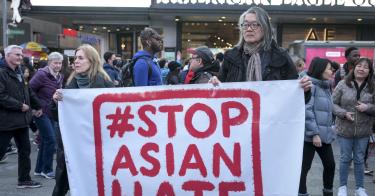The United States Commission on Civil Rights is in a bad way. Its job is to investigate discrimination and to study solutions to it, but it is dominated by liberal staff members who refuse to let the commission do its job. As a result, the commission’s work product is neither serious nor trustworthy.
Two of the commissioners, law professor Gail Heriot and attorney J. Christian Adams, detailed the commission’s decline in statements appended to the USCCR’s latest report about anti-Asian discrimination. The commissioners, who are supposed to run the USCCR, have been sidelined by staff members who abuse their authority to silence any discussion that undermines liberal narratives about race.
The current crisis began in 2022 when the commissioners decided to study anti-Asian discrimination. To that end, they listened to community leaders and experts who told the USCCR about the anti-Asian bias they experience and study.
The liberal staffers at the commission only wanted to hear about anti-Asian hate crimes and “hate incidents.” They define the latter as any biased acts, such as name-calling and posting “hateful” material. They did not want to hear about anti-Asian discrimination in other contexts, such as university admissions.
>>> Another Nail in the Coffin of Legalized Racial Discrimination
But even about anti-Asian hate crimes, the staffers’ interest was limited by their commitment to the liberal narrative on race. When the staffers published their final report of the briefings, they focused almost all their attention on the need to count anti-Asian crimes. But they refused to consider causes or realistic solutions.
For example, the staffers’ report refuses to confront the fact that, as one expert testified, anti-Asian hate crimes are disproportionately committed by African Americans. The report also refuses to confront the fact that generic violent crime is a much bigger problem for Asian Americans than hate crimes.
According to analyst Diana Yap, Asian Americans were the victims of 102,650 violent crimes in 2021 but only about 305 hate crimes. But the liberal staffers weren’t interested in violent crimes because, as several witnesses explained, the solution is tougher law enforcement, and that’s not popular with the Left.
So many of the recent high-profile homicides and violent attacks against Asians (for example, those against Christina Yuna Lee, Yao Pan Ma, GuiYing Ma, Michelle Go, Tommy Lau, and Vilma Kari) were all committed by men with long records of violence or dangerous mental illness. Lax law enforcement allowed them to be out on the streets when they should not have been. If law enforcement, especially progressive prosecutors, had done their jobs better, there would be fewer violent crimes and hate crimes.
Witnesses made these points during the briefings, but the staffers cut them out of the final report.
Instead, they encouraged the Department of Justice to count more anti-Asian hate crimes and “hate incidents” and to use the department’s “language access coordinator” aggressively to reduce disfavored speech—such as pointing out that COVID-19 originated in China or criticizing the Chinese government.
The most glaring omission from the report, however, is that nowhere does it mention anti-Asian discrimination in education. This is strange because this topic was a major focus for many witnesses. After all, as horrifying as hate crimes are, they are rare, but anti-Asian discrimination in schools is ubiquitous. The topic was also front and center, given the cases against Harvard University and the University of North Carolina that were pending at the Supreme Court during the briefings. It was not surprising, therefore, that many witnesses brought it up.
Or tried to.
>>> After Racial Preferences, What Comes Next?
They didn’t get far, however, because Staff Director Mauro Morales (an appointee of former President Barack Obama who is married to the president of a far-left activist organization) would not permit it. Even though the USCCR is run by the commissioners, Morales said that he had the power to shut down witnesses who addressed topics he didn’t like. For example, when one of the commissioners brought up anti-Asian discrimination in college admissions with attorney Eric Dreiband, who once ran the Civil Rights Division at the Department of Justice and served as the general counsel of the Equal Employment Opportunity Commission, Morales silenced him.
Morales said that he had “authority under 45 C.F.R. 701.11” to stop this discussion. But nothing in that provision gives the staff director any such authority. Adams reviewed the staff director’s authority and concluded in his statement that the director had no power “to prevent Commissioners from questioning witnesses.”
Nevertheless, some witnesses did manage to say a few things before being cut off. But you wouldn’t know it from the staff report because they’ve been cut out of it. The comments that Dreiband made before Morales cut him off are missing, as are the statistics on anti-Asian discrimination at Harvard University presented by Diane Yap. Also missing is the analysis from Devon Westhill, a general counsel of the Center for Equal Opportunity and a former assistant secretary for civil rights at the Department of Agriculture, explaining how the federal government’s fixation on “racial equity” reinforces anti-Asian discrimination.
Morales suppressed experts when they presented facts and analyses inconvenient to his politics. His equally partisan staff excised those experts and their analysis from the final report. As a result, the staff report is not worth the paper it’s printed on.
Putting aside the naked partisanship of it, only deeply unserious research can come from cherry-picking facts that support one’s prior opinions and all-too-clear biases. Yet that is the present state of the U.S. Commission on Civil Rights.
Under those conditions, why should anyone trust what it says?
This piece originally appeared in Restoring America by the Washington Examiner



